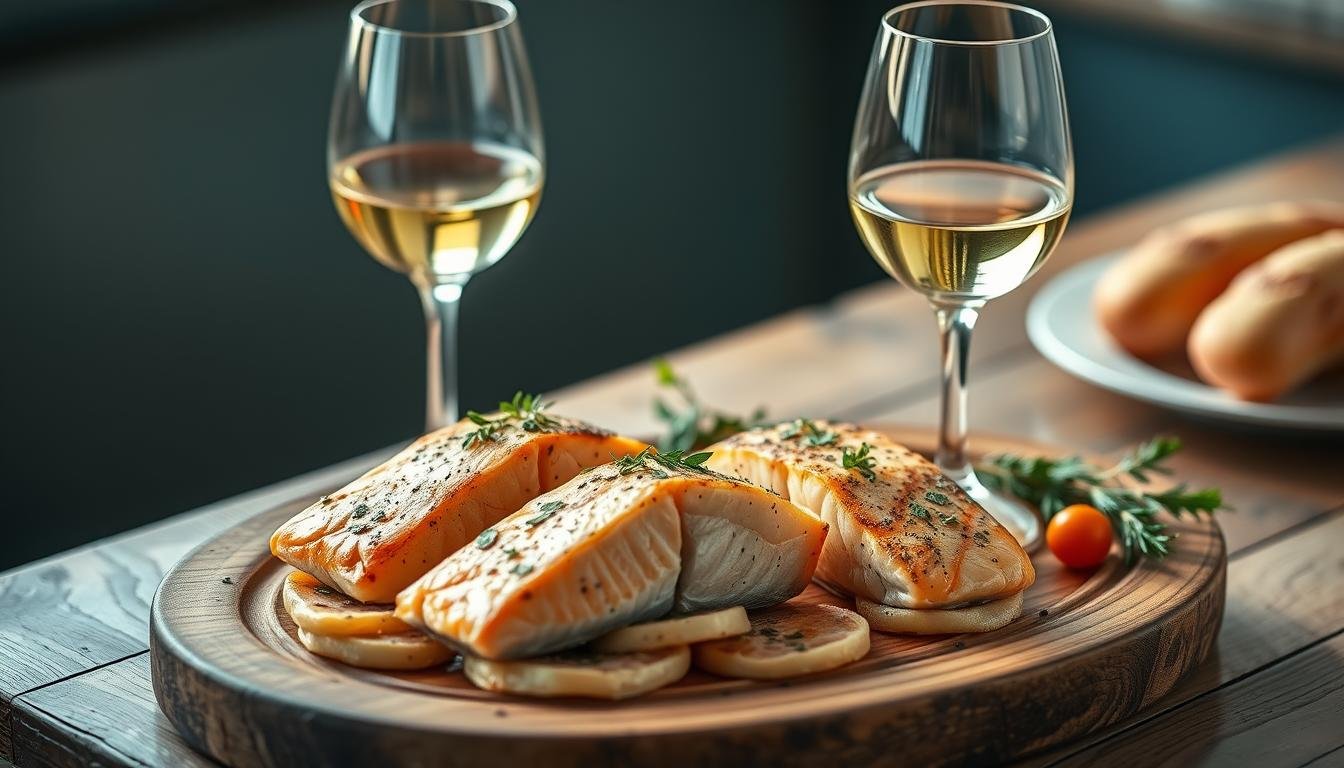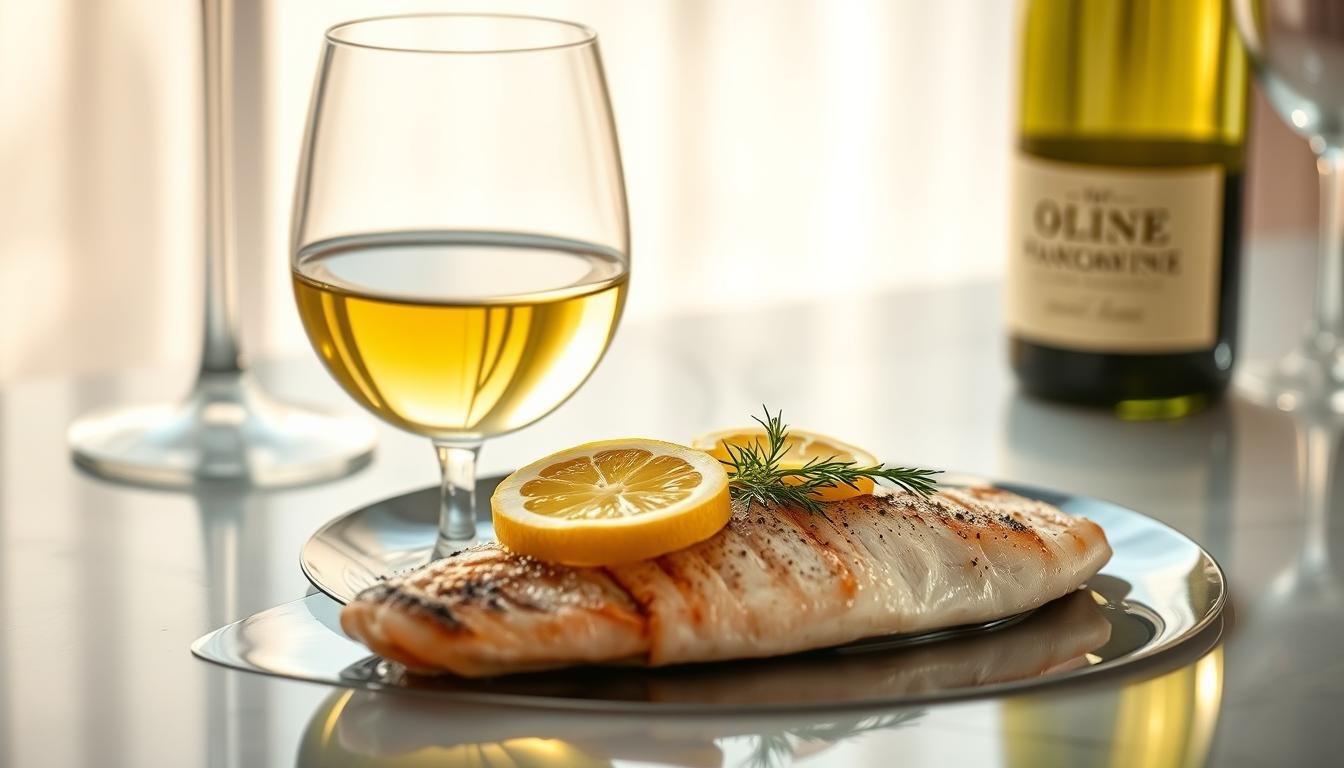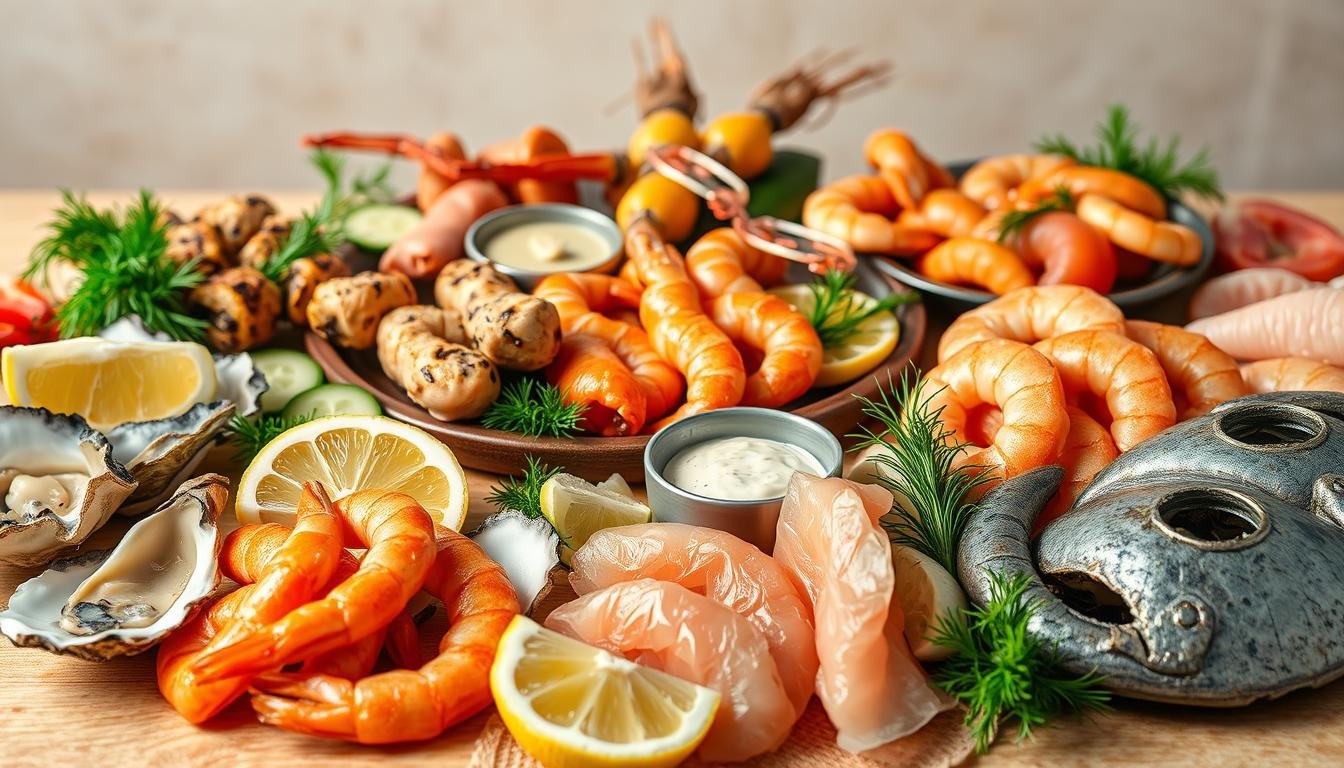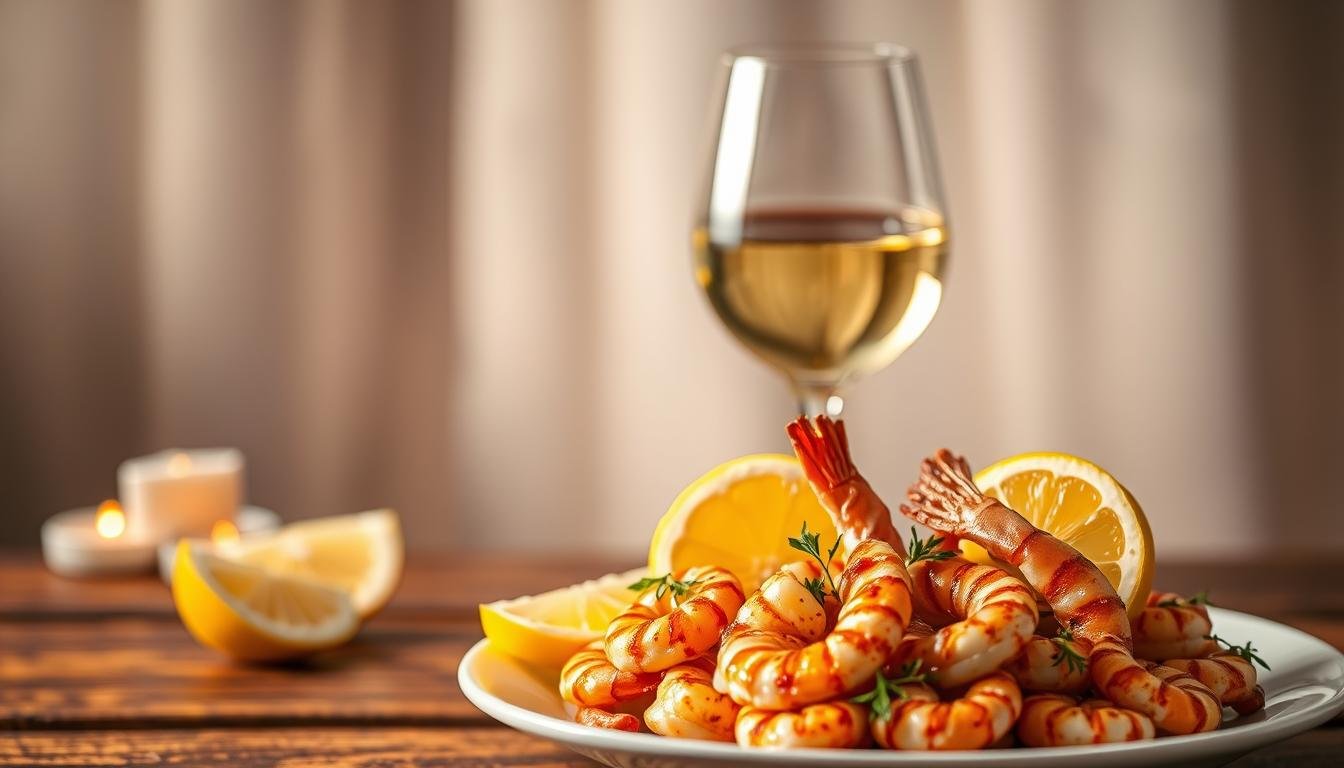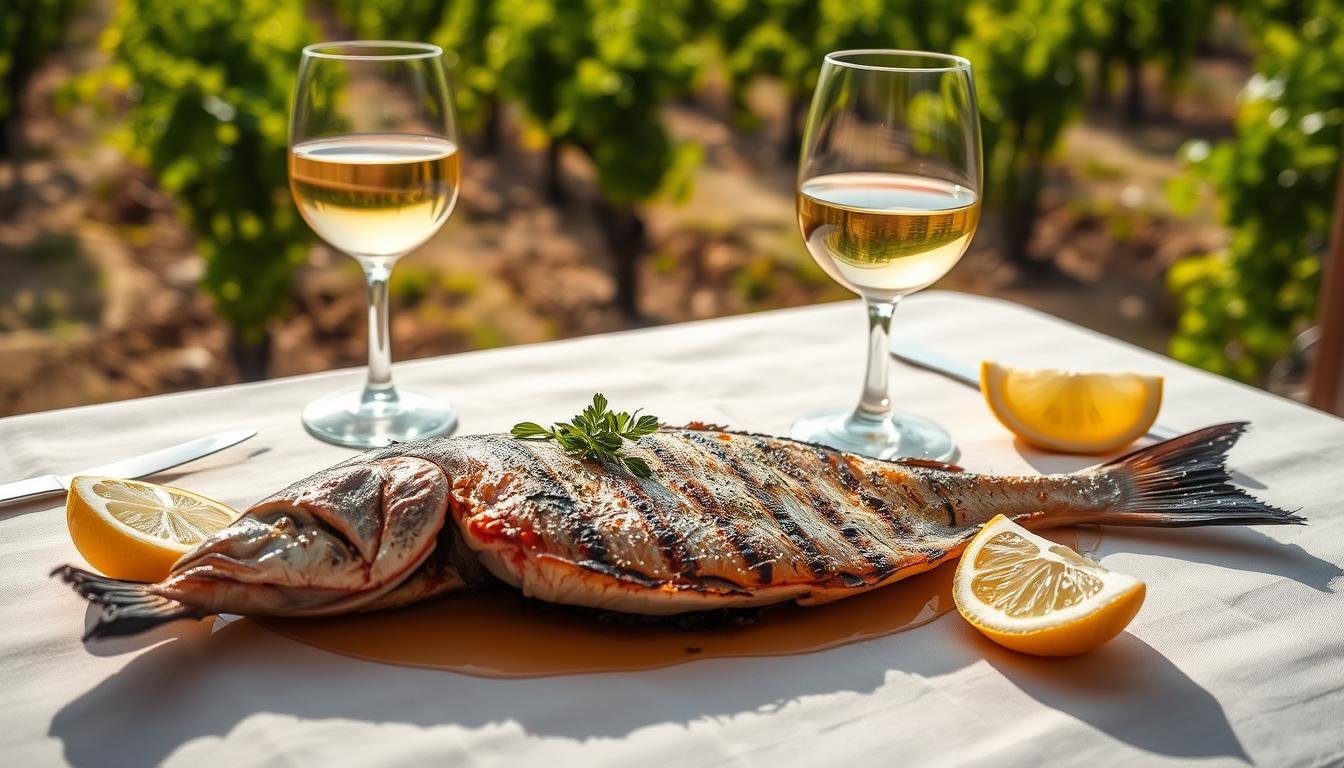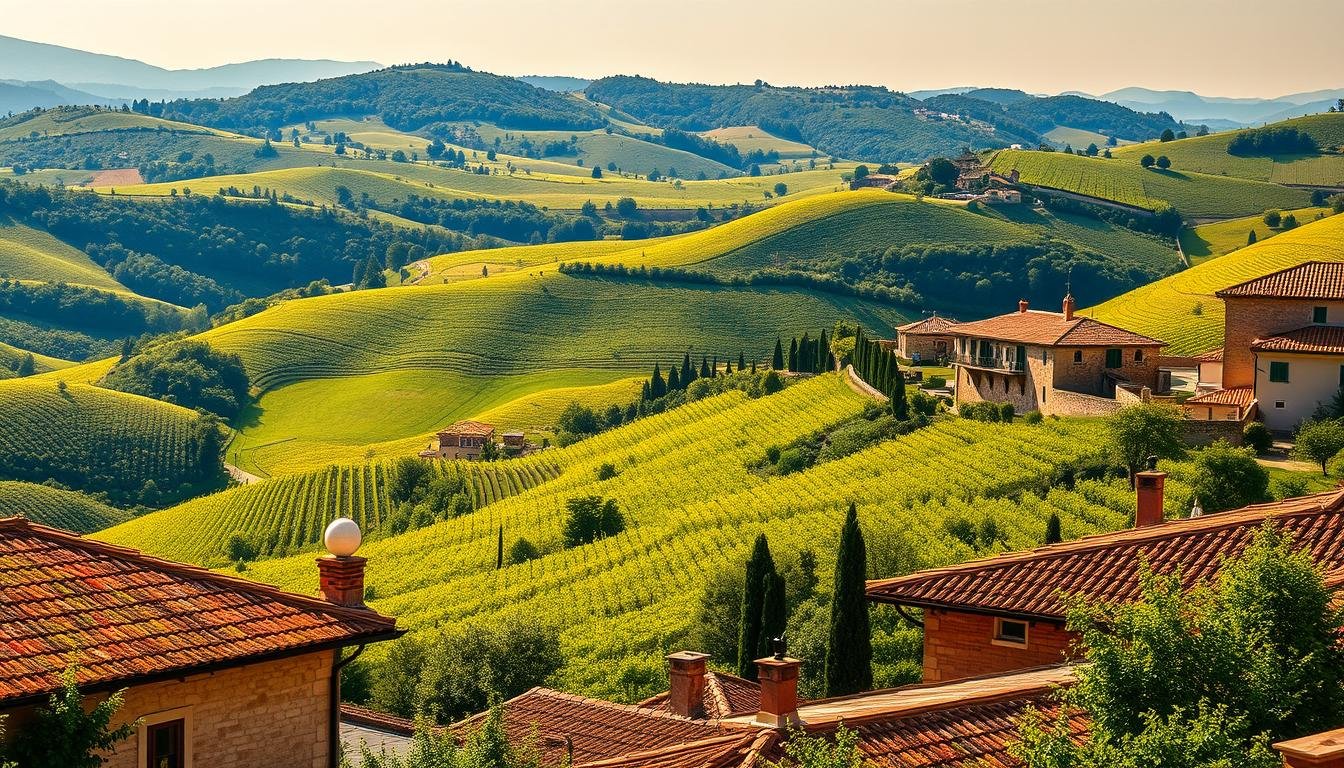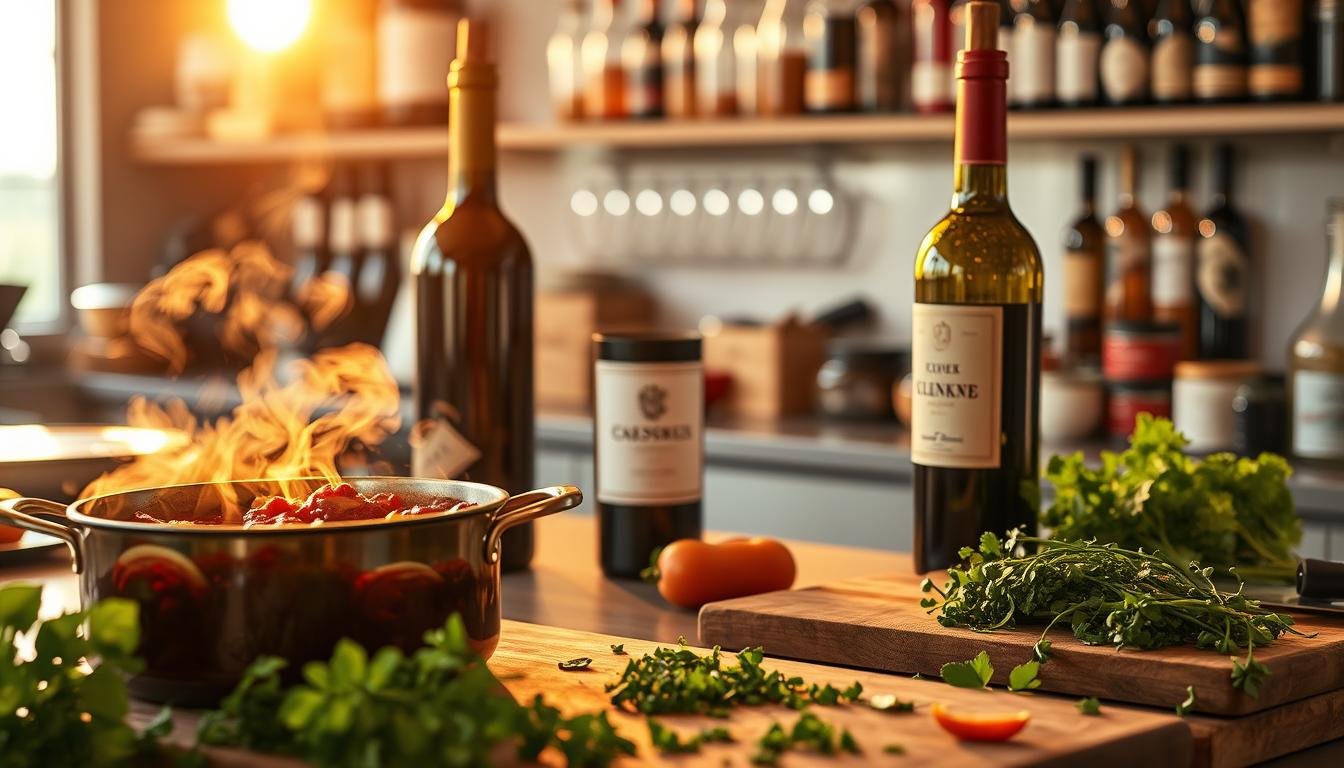Exploring the world of pairing salmon with wine can turn a simple meal into a special occasion. Salmon’s rich texture and varied flavors make it a perfect match for many wines. Whether you’re a wine expert or just starting out, learning about the best wines for salmon can elevate your cooking.
Salmon’s fatty texture pairs well with both white and red wines. You can choose from a full-bodied Chardonnay from France’s Burgundy to a light Pinot Noir from Oregon’s Willamette Valley. For example, the J.-A. Ferret Pouilly-Fuissé 2020 is a great white wine choice. Meanwhile, the Argyle Pinot Noir Willamette Valley Estate Reserve 2022 is perfect for red wine lovers.
Key Takeaways
- Salmon’s versatility allows it to pair well with both white and red wines due to its body and earthiness.
- A rich, medium- to full-bodied Chardonnay, such as the J.-A. Ferret Pouilly-Fuissé 2020, is a recommended white wine pairing.
- Pinot Noir, like the Argyle Pinot Noir Willamette Valley Estate Reserve 2022, is a classic red wine match for salmon.
- Consider the cooking method of salmon when selecting the best wine pairing.
- Pairing wine with salmon can greatly enhance your dining experience, making each bite more flavorful and memorable.
Understanding the Flavor Profile of Salmon
Exploring salmon’s flavors can make your meals more enjoyable. There are many types of salmon, each with its own taste and texture. These can pair well with different wines.
Types of Salmon and Their Tastes
The types of salmon you pick can change your meal. Sockeye salmon has a deep red color and a strong taste, great for grilling. King salmon, with its high fat and buttery feel, is best baked or roasted.
Here’s a quick comparison of flavors among different types of salmon:
| Type | Flavor Profile |
|---|---|
| Sockeye | Rich, robust, and firm |
| King | Buttery, rich, and high-fat |
| Coho | Delicate, subtle, with a gentle texture |
| Pink | Mild, soft, low-fat |
| Chum | Light, mild, and less fatty |
Nutritional Benefits of Salmon
Salmon is known for its health benefits. It’s full of omega-3 fatty acids, which are good for your heart and reduce inflammation. It also has high-quality protein, Vitamin B, and minerals. Eating salmon regularly can boost your metabolism and immune system.
How Cooking Methods Influence Flavor
Learning how to cook salmon can enhance its taste. Grilling gives it a smoky flavor and a crunchy texture, perfect with Sauvignon Blanc. Baking or roasting makes it richer and buttery, great with Chardonnay. Poaching or steaming keeps it delicate, matching well with Pinot Grigio.
Whether you like Sockeye’s boldness or King’s butteriness, knowing about types of salmon, their nutritional benefits, and how to cook salmon can make your meals and wine pairings better.
Why Wine Pairs Well with Salmon
Pairing wine with salmon makes for a great dining experience. This is true for 70% of wine lovers who enjoy pairing wine with fish, especially salmon. The fish’s rich flavor and the wine’s unique traits make this pairing special.
The Role of Acidity in Wine
The acidity in wine is key in matching the richness of salmon. Sauvignon Blanc, loved by 40% of people, has high acidity. This acidity cuts through salmon’s oily texture, offering a refreshing contrast.
Wines like Pinot Noir, recommended by 62% of sommeliers, balance the fatty richness of grilled or smoked salmon. This balance is crucial for a great dining experience.
Complementary Flavors: Wine and Salmon
Choosing the right wine for salmon is all about matching flavors. For example:
- Sauvignon Blanc and Sancerre: These French wines are perfect for salmon with herbs and citrus. They offer refreshing herby and citrus notes.
- Chardonnay: Lightly oaked Chardonnay pairs well with salmon in cream sauce or béarnaise. It complements the fish’s richness.
- Pinot Gris: This wine is great with salmon, featuring floral aromas and apple flavors.
- Riesling: It’s ideal for salmon with Asian flavors and soy-based marinades. Its sweetness levels are versatile.
These complementary flavors make every bite and sip more enjoyable.
Enhancing the Dining Experience
Pairing wine with salmon can turn a simple meal into a memorable one. Sparkling wines like Prosecco are great for smoked salmon appetizers, improving dining pleasure for over 50% of people.
In summer, 25% of diners prefer dry rosé with salmon for its refreshing taste. Wine and salmon not only enhance flavor but also make the dining atmosphere more enjoyable. This encourages a more relaxed and pleasurable meal.
| Salmon Dish | Recommended Wine | Attributes |
|---|---|---|
| Herb-Seasoned Salmon | Sauvignon Blanc, Sancerre | Herby, Citrusy |
| Salmon with Cream Sauce or Bérnaise | Lightly Oaked Chardonnay | Full-bodied, Rich |
| Asian-Flavored Salmon | Riesling | Versatile Sweetness |
| Smoked Salmon Appetizers | Prosecco | Refreshing, Vibrant |
| Grilled Salmon | Pinot Noir | Acidic, Silky Tannins |
Best White Wines for Salmon Dishes
Choosing the right white wine for salmon depends on how it’s prepared and its flavor. Chardonnay and Sauvignon Blanc are top picks. Each wine brings something special to your dish.
Chardonnay: A Classic Choice
Chardonnay pairs well with salmon, especially if it’s been aged in oak. Its buttery taste goes great with salmon’s creamy texture. Try a Sonoma Coast or Central Coast Chardonnay from California, or White Rioja from Spain.
Oak-aged Chardonnay is great for roasted salmon with creamy sauces. Look for wines from California, Washington, Australia, or Chile. These wines add depth to your meal, making it more enjoyable.
Sauvignon Blanc: Crisp and Refreshing
Sauvignon Blanc is perfect for a zesty pairing with salmon. Its acidity and citrus notes are great with spicier or herb-crusted salmon. You can find excellent Sauvignon Blanc in the Loire Valley, New Zealand, and Chile.
Warm climate Sauvignon Blanc also pairs well with roasted salmon. Its refreshing taste complements the salmon’s delicate flavor without overpowering it.
Try these pairings to make your meal unforgettable. For more wine pairing tips, check out Platings and Pairings and Wine Kalli.
Best Red Wines for Salmon Dishes
Pairing red wine with salmon might seem odd, but it’s actually a great match. The key is to pick wines with low tannins and good acidity. This way, the wine won’t overpower the fish’s flavor.
Pinot Noir: The Perfect Match
Pinot Noir is a top choice for pairing with salmon. Its light body and fruity taste complement the fish’s oily texture. Pinot Noir comes from places like Oregon, Washington, and Burgundy. It adds a bright acidity and earthy notes that go well with grilled or roasted salmon.
Roasted salmon with soy glaze or truffle oil pairs especially well with Pinot Noir.
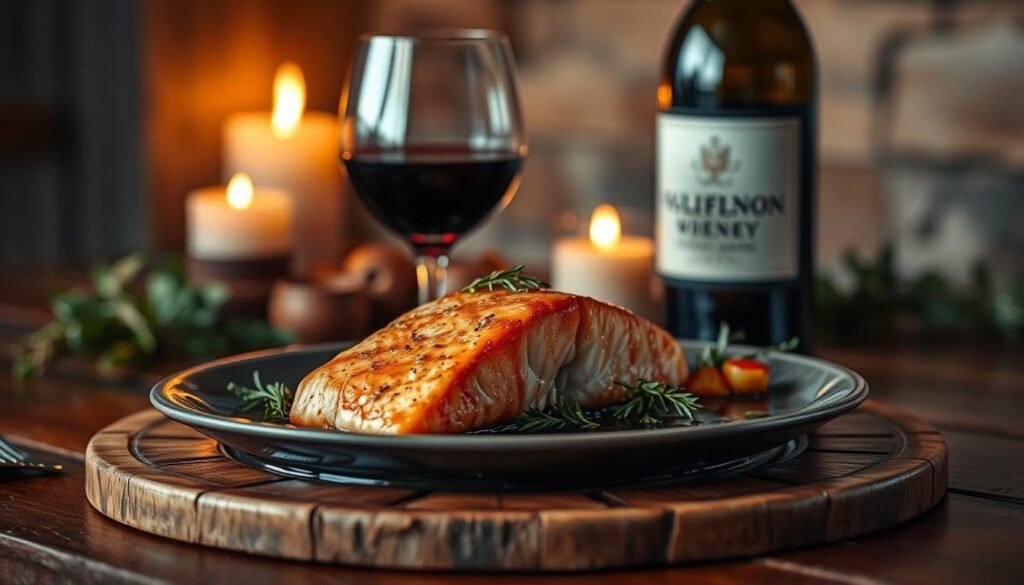
Other Red Wine Options to Consider
There are other red wines that pair well with salmon too. Beaujolais, made from gamay grapes, is a great option. It’s light and refreshing, perfect for grilled, baked, or smoked salmon. Beaujolais has low tannins, making it versatile for different salmon dishes.
Grenache is another red wine that pairs well with salmon. It has floral and fruity notes. Grown in Australia, the United States, Italy, and Spain, Grenache’s flavors complement heartier salmon dishes.
If you like bold pairings, try Cabernet Sauvignon. Even though it’s a high-tannin wine, an aged Cabernet can work with strong dishes. It pairs well with blackened salmon or salmon with tomato-based sauces.
Trying different red wines with salmon can make your meals more exciting. You’ll discover a range of flavors that bring out the best in salmon. For more wine pairing tips, check out this link.
Regional Pairings: Where Salmon Comes From
Understanding where salmon comes from can make your dining experience better. Choosing wines from the same region as the salmon can create perfect pairings. These pairings highlight the natural flavors of both the wine and the salmon.
Pacific Salmon Varieties and Local Wines
Pacific salmon is found along the West Coast and is known for its rich, fatty texture. The Pacific Northwest, especially Oregon and Washington, is famous for its vibrant wines. These wines, like pinot noir and pinot gris, are light and medium-bodied, making them great for Pacific salmon.
Oregon and Washington’s terroir gives their wines unique qualities. Washington’s Riesling is also a great choice, balancing the salmon’s flavors with its acidity and slight sweetness.
Atlantic Salmon: European Wine Pairings
Atlantic salmon, from European waters, has a milder flavor than Pacific salmon. It needs refined wine pairings from nearby European regions. French whites, like unoaked Chardonnay, are crisp and clean, enhancing the Atlantic salmon’s taste without overpowering it.
Marlborough’s Sauvignon Blanc is also a great match for Atlantic salmon. Its vibrant acidity and crispness complement the salmon’s gentle flavors. Portugal’s young vinho verde is another excellent choice, with its refreshing and light characteristics.
| Salmon Type | Wine Type | Region |
|---|---|---|
| Pacific Salmon | Pinot Noir, Pinot Gris, Riesling | Oregon, Washington |
| Atlantic Salmon | Unoaked Chardonnay, Sauvignon Blanc, Vinho Verde | France, New Zealand, Portugal |
These wines, from the West Coast or Europe, make your seafood and wine pairings unforgettable. They highlight the unique flavors of Pacific and Atlantic salmon, making your dining experience truly satisfying.
Cooking Techniques and Wine Selection
Salmon is a versatile fish that can be cooked in many ways. Each method changes how you choose the perfect wine to go with it. Knowing how to cook salmon, from grilling to baking, can make your meals better and bring out the fish’s natural taste.
Grilling Salmon: Wine Options
Grilling salmon gives it a smoky flavor. You need a strong wine to balance this taste. A good choice is an elegant Pinot Noir, especially from Oregon’s Willamette Valley or Burgundy. This wine is light-bodied but strong enough to match the smoky flavor of the fish.
Another great choice for grilled salmon is a crisp Chardonnay from cool places like Chablis or the Sonoma Coast in California. These Chardonnays have bright acidity that cuts through the rich flavors of butter or light sauces often used with grilled salmon.
- Grilled salmon steaks with soy glaze: Elegant Pinot Noir
- Grilled salmon with light butter sauce: Crisp Chardonnay
Baking and Roasting: Ideal Pairings
When baking or roasting salmon, you want wines that enhance its natural flavors. A vibrant Sauvignon Blanc from New Zealand is great for dishes like salmon sushi rolls or poke bowls. It has citrus and herbal notes that match the fish’s flavors.
For richer baked salmon dishes, like salmon with garlic butter, an unoaked Chardonnay is perfect. This wine has clean, bright flavors that complement the dish’s simplicity and the fish’s delicate texture.
- Baked salmon with lemon and herbs: Crisp Chardonnay
- Baked salmon with garlic butter: Unoaked Chardonnay
A bold Cabernet Sauvignon with softer tannins is also good. It works well with roasted or blackened salmon dishes that have strong flavors. The wine’s robust structure can handle strong seasonings like Cajun spices.
- Blackened salmon with Cajun spices: Bold Cabernet Sauvignon
- Roasted salmon with mushrooms or truffle oil: Elegant Pinot Noir
For more tips on pairing techniques, check out salmon and wine pairing tips and how to pair wine like a pro. Using these strategies can make your meals unforgettable.
Sauces and Sides: Pairing with Wine
When picking wine for salmon, the sauces and sides matter a lot. The right wine can make the meal better by bringing out the flavors. It can also match the creamy sauce or the light sides.
Creamy Sauces and Wine Choices
For salmon with creamy sauce, like béarnaise or cream sauce, choose full-bodied white wines. An oak-aged Chardonnay, like Rodney Strong Chalk Hill Chardonnay, is perfect. It matches the sauce and salmon’s texture well.
A lightly oaked Chardonnay also works great with creamy sauces. It doesn’t overpower the dish.
Looking into different wine pairings shows another good choice: a Semillon from Hunter Valley. Its complex aroma goes well with the salmon, adding depth. For a wine that cuts through creaminess, try a dry Riesling from Clare Valley. It has a bright, crisp finish.
Light Sides That Pair Well with Salmon
Choosing the right sides for salmon means picking wines that go well with them. Roasted veggies like asparagus or Brussels sprouts are a good contrast. A crisp, dry Sauvignon Blanc, like Cloudy Bay Sauvignon Blanc, brings out the herbal and citrus notes.
A green salad with lemon vinaigrette is refreshing with salmon. Wines like fruity Pinot Gris or versatile Prosecco balance the vinaigrette’s acidity. They also complement the salmon’s natural flavors.
| Wine | Recommended Pairing | Notes |
|---|---|---|
| Rodney Strong Chalk Hill Chardonnay | Creamy or butter sauce salmon | Rich and full-bodied, pairs excellently with creamy textures. |
| Cloudy Bay Sauvignon Blanc | Light sides, smoked salmon | Enhances herbal and citrus flavors, versatile for various sides. |
| Semillon from Hunter Valley | Creamy sauces | Complex aroma complements the richness of the dish. |
| Dry Riesling from Clare Valley | Creamy sauces, Asian-inspired dishes | High acidity balances rich textures and spicy flavors. |
Wine Serving Tips for Salmon Dishes
Pairing wine with salmon is more than just picking the right wine. How you serve it matters a lot. We’ll cover key wine serving tips, like the perfect wine temperature for salmon and the right glassware for a better dining experience.
Ideal Serving Temperature for Wine
Finding the right wine temperature for salmon is key for balanced flavors. White wines like Chardonnay and Sauvignon Blanc should be chilled between 48°F and 52°F. This keeps their acidity and crispness, making them great with salmon.
Red wines, such as Pinot Noir, should be a bit cooler, around 55°F to 60°F. This lets their full aroma come through without overpowering the meal.
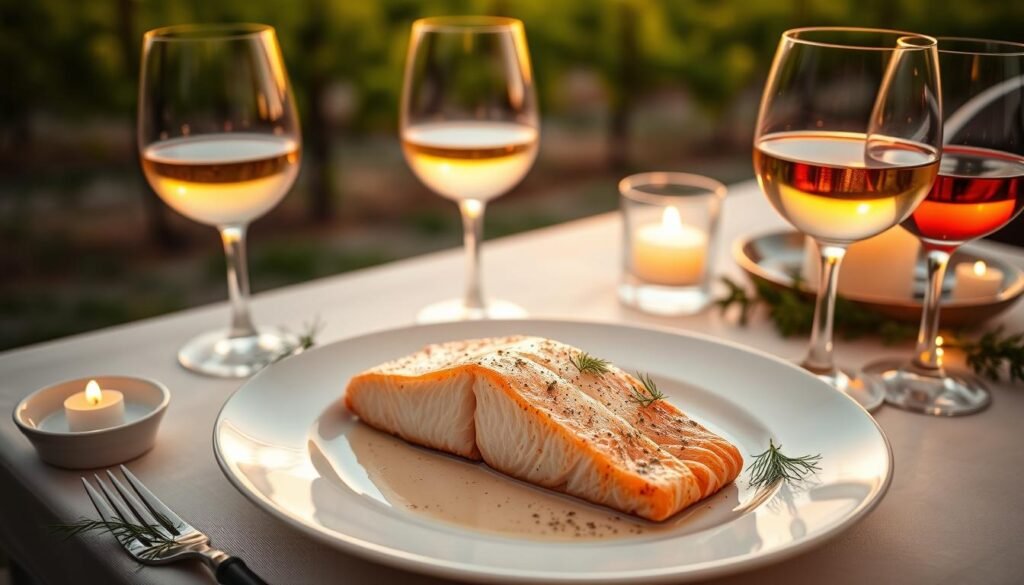
Glassware Considerations
The correct glassware for wine greatly affects how it tastes. For white wines, a narrow bowl glass is best. It focuses the aromas and directs the wine to your tongue, enhancing its refreshing qualities.
Red wines, like Pinot Noir, need a larger bowl glass. This allows for better aeration and releases complex aromas. Champagne and sparkling wines should be in flute glasses. This keeps their bubbles and highlights their delicate flavors.
| Wine Type | Ideal Temperature | Glassware |
|---|---|---|
| Chardonnay | 48°F – 52°F | Narrow Bowl Glass |
| Sauvignon Blanc | 48°F – 52°F | Narrow Bowl Glass |
| Pinot Noir | 55°F – 60°F | Large Bowl Glass |
| Champagne | 45°F | Flute Glass |
By following these wine serving tips, you’ll improve your wine’s taste and your dining experience. For more ways to enhance your wine experience, including top wine accessories, check out this comprehensive guide.
Understanding Wine Labels and Terminology
When you’re pairing wine with salmon, knowing about wine labels and terms is key. Wine labels give you a lot of information to help you choose. They tell you about the wine’s origin, grape type, and vintage.
Decoding Wine Regions and Grapes
Wine regions tell you a lot about a wine’s taste. For example, Bordeaux in France is famous for its high-quality wines. In the U.S., wines must be at least 85% from a certain region to use that name.
Grape varieties are also important. Bordeaux wines mix grapes like Cabernet Sauvignon and Merlot. Knowing the grapes helps you guess how the wine will taste with salmon.
The Importance of Vintage
The vintage is the year the grapes were picked. It affects the wine’s quality and how long it can age. For example, DanCin 2022 En Croix Chardonnay is a good match for salmon and can get better with time.
In the U.S., wine labels can be off by up to 1.5% from the stated alcohol content. This matters if you like wines with certain alcohol levels.
Look for “Salmon Safe” and “LIVE Certified” on labels. These mean the wine is made sustainably. They help you choose wines that match your values.
To learn more, check out this basic wine knowledge crash course and this guide on wine labels and terms.
| Wine | Region | Alcohol Content | Price |
|---|---|---|---|
| DanCin 2022 En Croix Chardonnay | Oregon | 12.8% | $36 |
| DanCin 2021 Sorella 63rd Barbera | California | 14.8% | $60 |
| Gramercy Cellars’ Lower East Rosé | Washington | 12.5% | $30 |
Hosting a Salmon and Wine Dinner
Planning a memorable evening with salmon and wine can seem daunting. But with the right preparation, it can be easy. Hosting a wine dinner with salmon dishes impresses your guests and creates a memorable night.
Menu Ideas for Your Guests
When planning salmon dinner ideas, variety is key. A diverse menu pleases everyone, no matter their taste. Here are some inspired choices:
- Bourbon-Glazed Salmon: This dish has a unique flavor from bourbon. It pairs well with an oaked Chardonnay.
- Cedar Plank Salmon with Blackberry Sauce: Grilling on cedar planks adds a smoky flavor. It’s paired with fruity Pinot Noir.
- Grilled Salmon Steaks: Guests love these, especially from the Pacific Northwest. They pair well with a crisp Sauvignon Blanc.
- Speedy Salmon Patties: These can be made ahead and frozen. They’re versatile and pair with Pinot Grigio.
These recipes take 15 to 45 minutes to make, with an average prep time of 25 to 35 minutes. Most are easy for beginners. For more advanced dishes, try “Smoked Honey-Peppercorn Salmon.”
For more salmon dinner ideas and recipes, visit Food and Wine.
Wine Tasting Tips
Hosting a wine tasting at home adds sophistication to your dinner party. Here are some tips to get started:
- Select a Range of Wines: Offer different wines like Pinot Noir, Cabernet Sauvignon, and Moscato. Choose premium wines like Crémant or Champagne Blanc de Blancs Brut Nature for upscale dishes.
- Serve at the Right Temperature: White wines should be chilled (around 50°F), and red wines should be slightly cooler (around 60-65°F). This is crucial for outdoor dinners to keep the wine tasting great.
- Use Appropriate Glassware: Use the right glassware to enhance the tasting experience. For example, a narrow glass for sparkling wines and a wider bowl for reds.
- Educate Your Guests: Share interesting facts about the wines and their regions. Discuss the role of acidity in wine or the importance of vintage.
Creating a welcoming atmosphere is key for a successful event. Resources like Wine Kalli offer expert advice on planning wine events.
Here’s a pairing table to help plan your dinner:
| Menu Item | Cooking Method | Recommended Wine | Prep Time (minutes) | Calories |
|---|---|---|---|---|
| Bourbon-Glazed Salmon | Grilling | Oaked Chardonnay | 30 | 439 |
| Cedar Plank Salmon with Blackberry Sauce | Grilling | Pinot Noir | 35 | 439 |
| Grilled Salmon Steaks | Grilling | Sauvignon Blanc | 25 | 439 |
| Speedy Salmon Patties | Air Frying | Pinot Grigio | 20 | 439 |
By choosing recipes and wines carefully, you can create a delightful dining experience. Enjoy hosting your elegant salmon and wine dinner, and cherish every moment!
Common Mistakes to Avoid
When pairing wine with salmon, it’s key to avoid common mistakes. Choosing the right wine and serving it correctly can make your meal special. This way, both the wine and the fish will taste great.
Overwhelming Flavors: What Not to Do
Choosing a wine that’s too strong is a big mistake. It can hide the salmon’s taste. Instead, pick a wine like a crisp Sauvignon Blanc or a light Pinot Noir. These wines will enhance the salmon’s flavor without overpowering it.
Temperature Faux Pas
Not paying attention to wine temperature is a common error. Serving white wine too cold can dull its taste. On the other hand, red wine that’s too warm can taste boozy.
For the best taste, chill white wine to 45-50 degrees Fahrenheit. Red wine should be slightly cooler than room temperature, around 60-65 degrees Fahrenheit. This way, the wine’s flavors will complement your salmon perfectly.
Key Guidelines: Temperature and Flavor Balance
| Mistake | Recommended Action |
|---|---|
| Choosing Overpowering Wines | Select lighter wines such as Sauvignon Blanc or Pinot Noir. |
| Serving White Wine Too Cold | Chill white wine to 45-50 degrees Fahrenheit. |
| Serving Red Wine Too Warm | Serve red wine at 60-65 degrees Fahrenheit. |
Whether cooking salmon with the skin side down or choosing the right wine, aim for a perfect pairing. For more tips on cooking salmon, check out this guide. Knowing these tips can elevate your dining experience.
Conclusion: The Perfect Pairing Awaits
Exploring wine and salmon pairings is a journey filled with joy. You’ve learned how salmon’s flavors blend with different wines, making meals better. Whether it’s a crisp Sauvignon Blanc for light dishes or a Pinot Noir for meatier ones, there’s a perfect wine for every taste.
Try new combinations to find your favorites. Each dish, from smoked to grilled, offers a chance to discover great wine matches. This guide will help make your meals truly special.
Perfect pairings can make any meal unforgettable. Whether you’re hosting or enjoying a quiet dinner, pairing wine with salmon can elevate your experience. Now, you’re ready to create memorable moments with every pairing.

